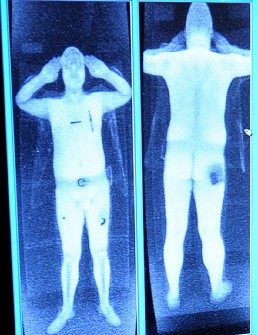MANCHESTER, England, Jan 8 (AFP) - It was initially an idea to speed up passenger waiting times, but Manchester Airport now finds itself as the only one in Britain using body scanners, in the wake of the Detroit plane attack.
Since the December 25 scare, the government has rushed to get body scanners into full operation at British airports.

The first are set to be in place before February at London Heathrow, the world's busiest international passenger air hub, with other airports getting them by the end of the year.
But at Manchester Airport in northwest England, Britain's busiest outside the London region, a body scanner has been on a 12-month trial since October, with passengers being scanned on a voluntary basis.
The 80,000-pound (130,000-dollar, 90,000-euro) machine looks like a small booth and uses radio frequencies to scan beneath clothing and produce a 3D image of the individual's body.
While the scanner does not produce an image of the naked body, it has caused consternation among privacy advocates because it does faithfully reproduce a body's curves hidden beneath clothing.
At Manchester Airport, passengers stand for seven seconds between the scanner's two black blocks, with their fingers on their temples.
A conventional, thorough pat-down search can take up to five minutes.
The scanner penetrates four millimetres under the skin, so any objects in pockets, such as lighters, keys, pens and wallets, or anything hidden under the clothing is shown up.
The image produced is sent to an operator in another part of the airport, who then highlights anything requiring a further manual inspection by circling it in red. That image is then returned to the security officer next to the booth who would then search for those items.
The system means the analyst cannot see the passenger whose body has been scanned. The image is not stored.
"People have said it's like a naked image, but as you see the process it's not quite like that," Manchester Airport spokesman John Greenway told AFP.
"The whole reason why we wanted to introduce this was to improve the customers' experience.
"We want the passengers to choose our airport to travel from. We want to make it hassle-free and easy to use. This type of security could potentially provide that."
Since the scanner was introduced, around 500 people have volunteered to go through.
Some have deep reservations.
"If you start to accept this as normal, where is it going to lead to?" asked Scott, 38, from Wakebridge, southeast of Manchester. "I don't agree with it, I think it should be optional. Better to get a full pat down."
But Charlotte, 21, a student in Germany, said: "Everything that improves security is a good idea. Essentially, that kind of thing will be kept confidential, so I don't really see the problem.
"I think most people would agree that a physical search is actually more intimate and intimidating."
Some human rights groups have campaigned against the use of body scanners, particularly on children.
"The under-18 issue us on everybody's mind at the moment," Greenway said.
"We'll have to wait and see what the government thinks about that."
Considering the rush for body scanners in the wake of the failed plot on an Amsterdam to Detroit flight, Greenway said: "People are obviously asking about the Detroit bomb scare, would this have picked it up.
"Potentially it would have picked it up. Obviously there needs to be a bit more testing before we say categorically 'yes.'
"What always happens in airport security is, new threats emerge. That is just part of the world that we live in at the moment," he added.
"New threats will emerge because of the introduction of body scanners and airports will need to raise their game."
























